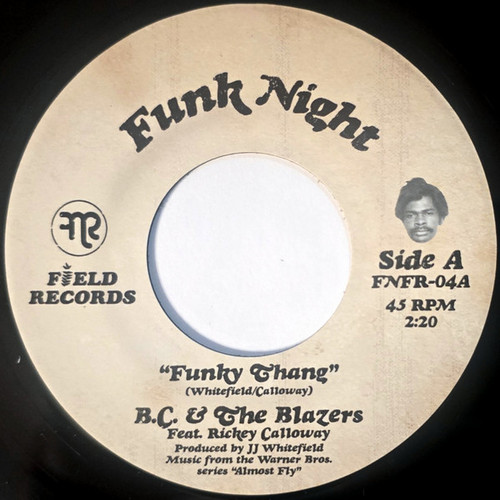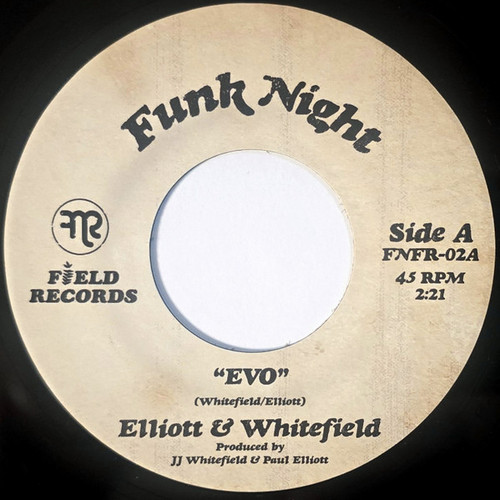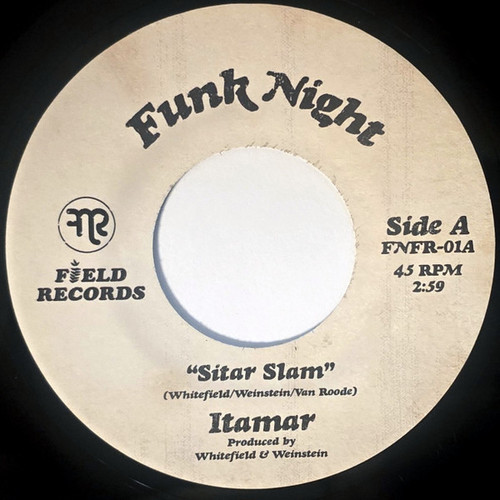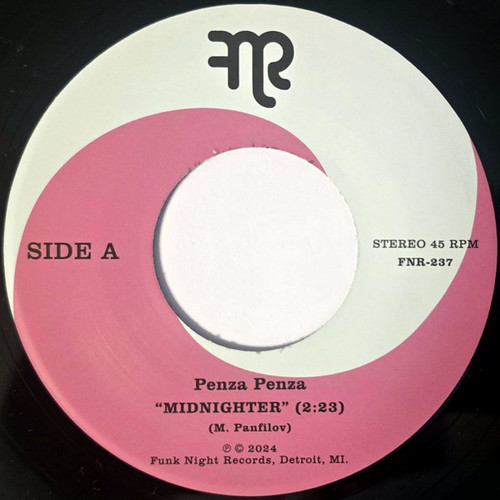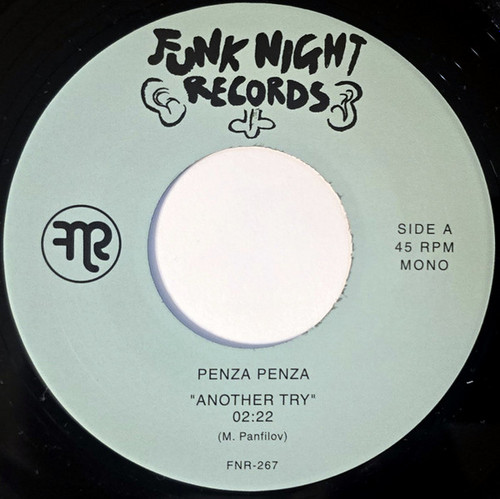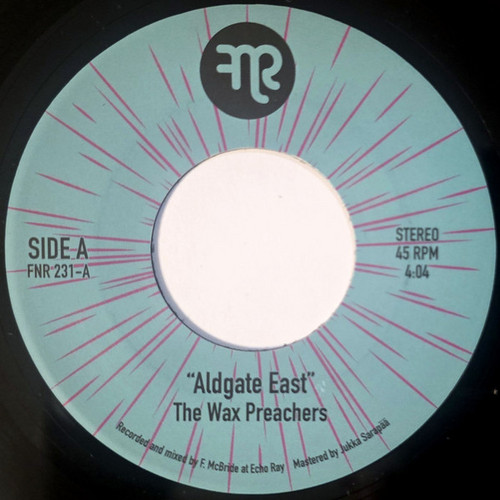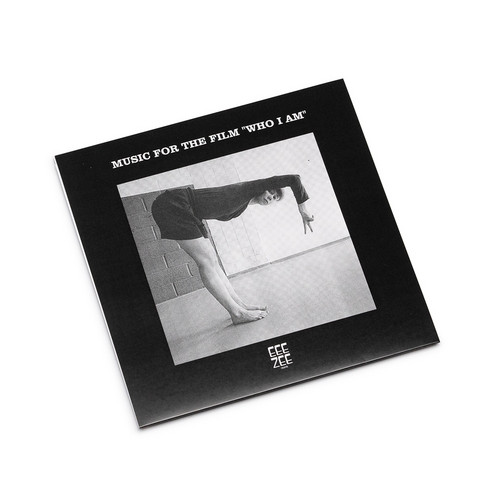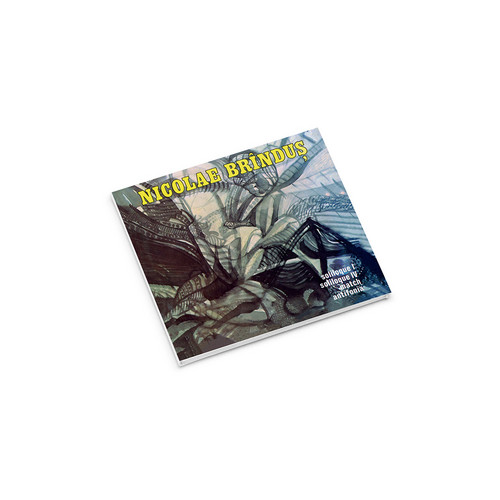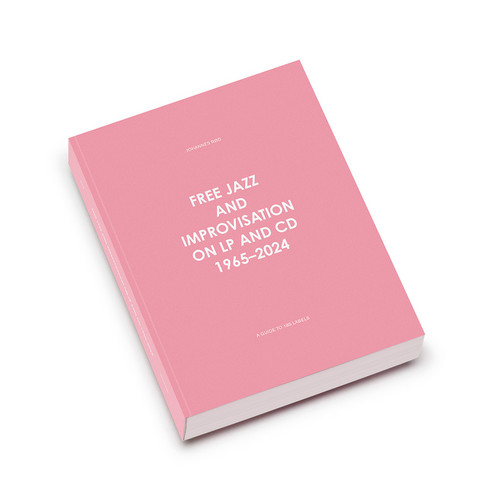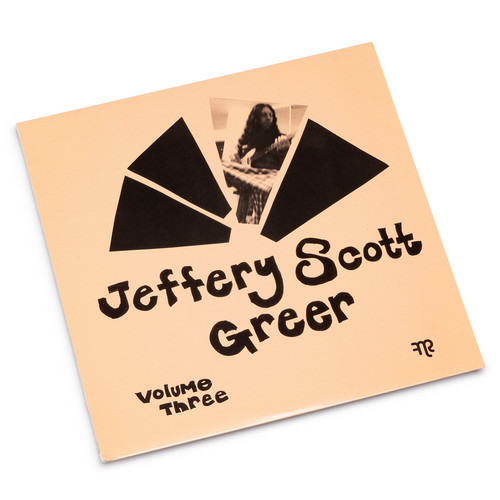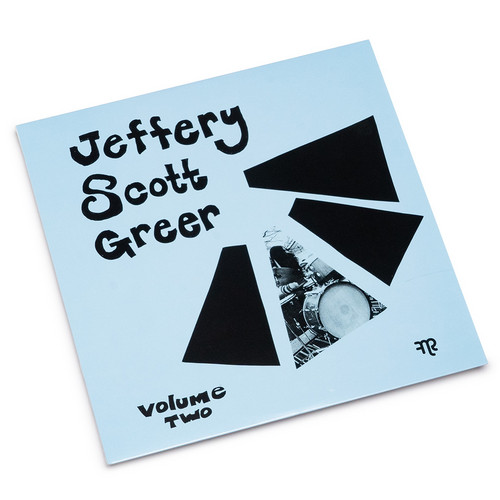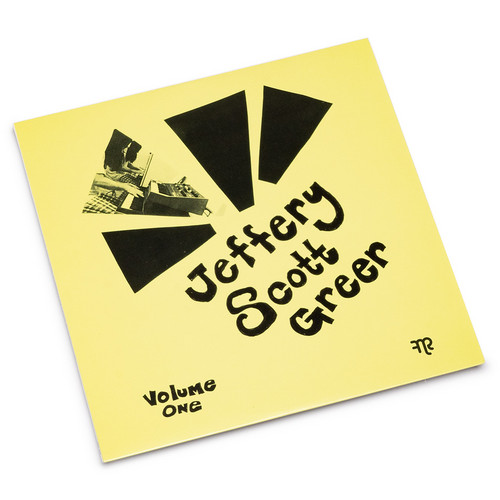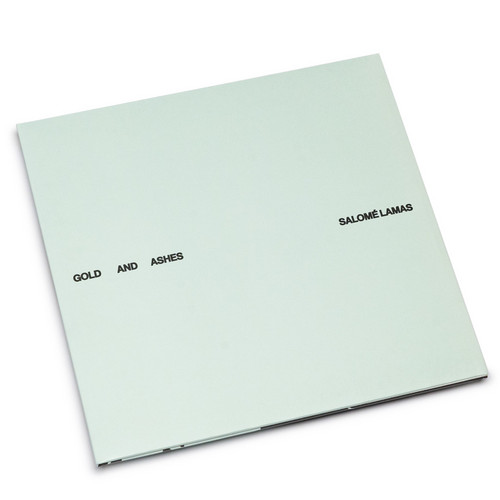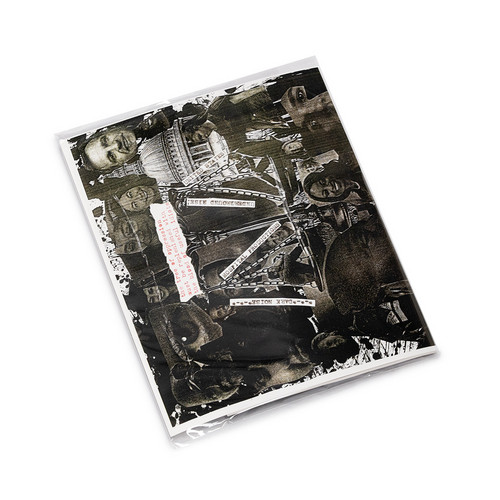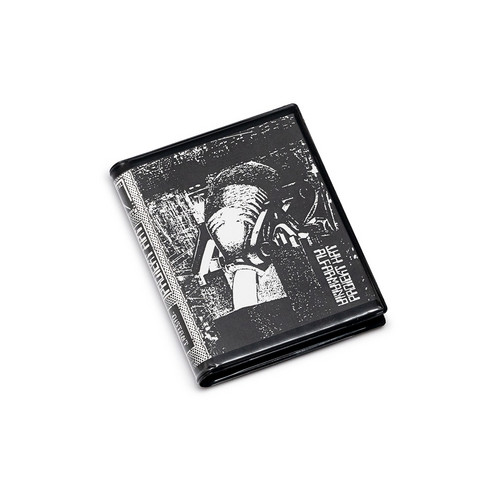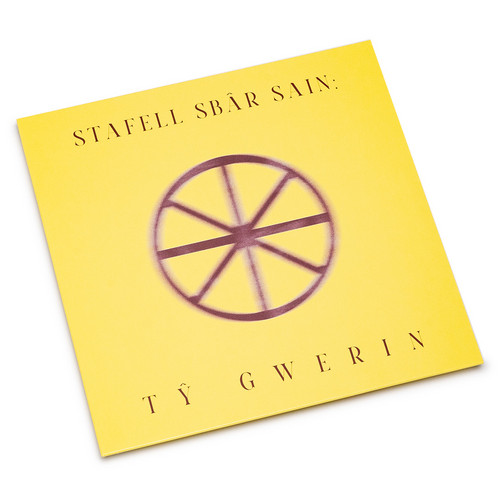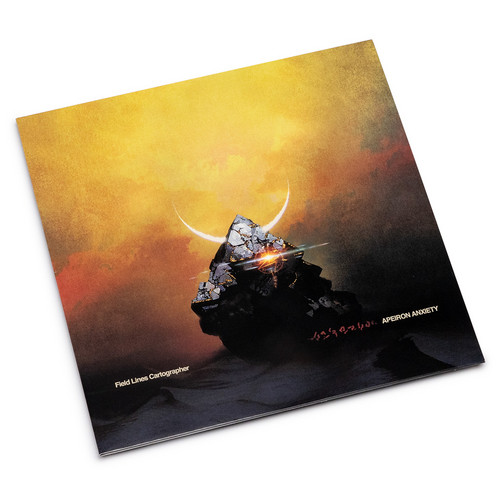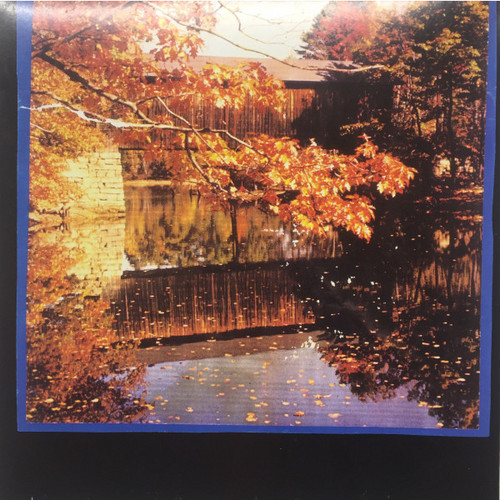New Arrivals
Funky Thang / Keep On Coming
This 7" single showcases a dynamic collaboration between B.C. & The Blazers featuring the soulful vocals of Rickey Calloway and the vibrant energy of Rise. On the A-side, "Funky Thang" delivers a groovy blend of classic funk rhythms, tight guitar riffs, and infectious horn lines, making it an irresistible dancefloor mover. The B-side, "Keep On Coming," keeps the momentum going with its upbeat tempo and catchy hooks, reflecting a raw and energetic spirit characteristic of funk’s golden era. This …
EVO
EVO is a limited edition 7-inch vinyl release by Elliott & Whitefield on the Funk Night Field Records label. With only 300 copies available, this record features the standout track 'EVO,' a compact yet powerful composition just over two minutes long, paired with the B-side 'Sha In Egy.' This release marks the second of four on the label, highlighting the creative collaboration between Funk Night Records and the legendary JJ Whitefield.
Sitar Slam
Sitar Slam by Itamar is a captivating 7-inch vinyl release that blends exotic sitar melodies with infectious funk grooves. Released in 2025 on Funk Night Field Records, this track showcases trippy, liquid sitar sounds weaving through vibrant, percussive rhythms that create an energetic and organic groove. The music delivers a fresh fusion of instrumental funk and world music elements, making it a unique and lively listening experience.
Midnighter
The 7" "Penza Penza – Midnighter" on FNR delivers a hypnotic blend of dark, psychedelic electronica and post-punk energy. Penza Penza crafts an immersive soundscape featuring driving rhythms, layered synths, and a shadowy atmosphere that pulls listeners into a nocturnal, almost cinematic journey. This release highlights the band’s knack for moody, experimental grooves with a modern edge, perfect for fans of underground electronic music looking for something both evocative and danceable.
Another Try
"Another Try" by Penza Penza is a captivating 7" funk and soul single, released in 2025. Featuring raw, lo-fi fuzz and psychedelic guitar riffs, the track builds on smooth grooves and vamping chords, delivering a timeless sound that blends vintage vibes with a modern edge. It is part of the album "Hang Loose! I Got Dem Ol' Surfer Bloos" and showcases Penza Penza's ability to craft music with both nostalgic warmth and fresh energy. This release is perfect for fans of soulful, funky beats with a t…
The Holy Mountain
The Wax Preachers' "The Holy Mountain" is a 7" single released in 2025 on Funk Night Records, featuring an energetic and horn-driven instrumental funk sound. The title track "The Holy Mountain" is an uptempo funk tune with a fat extended drum breakdown, showcasing the band's hard-hitting funk style inspired by vintage funk and roots traditions from London. The B-side of the single includes the track "Sun Trap," complementing their signature groove and instrumental prowess. This release highlight…
Aldgate East
The 7" single "Aldgate East" by The Wax Preachers, released on Funk Night Records (FNR-231), is a horn-driven instrumental funk powerhouse from London. The record features two tracks: "Aldgate East" on side A and "Gamma Ray" on side B. The Wax Preachers channel raw energy from vintage funk, soul, breakbeats, and afrobeat traditions, honoring these roots with analogue recording and a DIY production approach. This release showcases their hard-hitting, horn-led sound that is energetic and groove-he…
Music For The Film "Who I Am"
Misha Panfilov's "Music For The Film 'Who I Am'" is a soundtrack composed for Sofia Kruusamägi's short dance film. The music is characterized by repetitive rhythms and patterns, a deep groove, and a blend of hypnotic and evocative sounds that reflect the artistic and emotional depth of the film. Originally recorded in June 2021, it was released as a lathe cut in 2022 and showcases Panfilov's skills as a composer, multi-instrumentalist, and producer. The soundtrack captures the film's introspecti…
Match / Soliloque 1&4 / Antifonia
Nicolae Brînduş's Match / Soliloque 1&4 / Antifonia reissues the composer’s most eccentric works from the PHTORA cycle (1968-1972), blending collective improvisation, spectral tradition, Romanian folklore, and free jazz into a mesmerizing tapestry. Tape manipulations and reverberation add depth, while Ana Golici’s sleeve art captures the album’s vivid sensibility.
Free Jazz and Improvisation on LP and CD, 1965-2024 (Book)
More copies due in early December. 428 pages. This is exactly what we need. Big time. Johannes Rød returns with the massively expanded edition of his essential guide - a monument of discographic research spanning six decades of creative music documentation. 381 pages plus 47 unnumbered pages of label artwork. 185 labels mapped with obsessive detail and passionate advocacy. From the explosive emergence of free jazz in the mid-1960s through ESP-Disk, BYG Actuel, and Actuel, through the European im…
Schematics For A Blank Stare - Volume Three
2025 stock "Schematics For A Blank Stare - Volume Three" is a meticulously crafted album that explores organic grooves with a strong funk and soul influence. Released in 2021 under the Funk Night label, this LP vinyl captures Jeffery Scott Greer's signature lo-fi funk sound, recording straight to cassette tape for an authentic vintage feel. The album showcases a blend of groovy, soulful tracks that offer a rich auditory journey for fans of instrumental funk and soul music. It's a perfect additio…
Schematics For A Blank Stare - Volume Two
2025 stock "Schematics For A Blank Stare - Volume Two" is a lo-fi instrumental funk album released in 2021 under the Funk Night label. On this album, Jeffery Scott Greer showcases his multi-instrumentalist talent, playing bass guitar, Fender Rhodes electric piano, guitar, flute, drums, Moog synthesizer, and conga drums. The record is characterized by organic grooves with a blend of funk and soul styles, all recorded uniquely using a Tascam 424 four-track cassette. It delivers a rich, warm sound …
Schematics For A Blank Stare - Volume One
2025 stock "Schematics For A Blank Stare - Volume One" by Jeffery Scott Greer is a collection of lo-fi funk tracks, released in 2021 under Funk Night Records. It features a distinctive organic grooves style with influences from funk and soul genres. The album was recorded on a 4-track cassette between January and June 2017, showcasing a raw and authentic sound. Key tracks include "Gorilla Funk 1," "Orange September," "Hazy Lazy," "Druid Soul," "Night Of The Fox," and "Space Debris." The project …
Gold and Ashes
Our first object of inquiry and care should be life. We know the reason for that as we are living beings in a situation in which the conditions of life are endangered. What has no place in this ecological discourse is death. The fact that death is difficult to acknowledge is not new, but in our contemporary situation, death has a new face.Gold and Ashes extends beyond representation to become an intimate act of excavation that proposes to mediate—materially, politically, and metaphysically—the r…
The Grift Is Meant To End Up Good For The Grifter
Dark noise recalling opening moments from classics like Ministry Of Foolishness by M and T connelly with Jim Mroz radical noise storm!
Distant Space Confined
Like crystal radio receivers powered by leaking car batteries randomly attuned to pick up garbled slices of hyper carrier waves, the magnetic stereo tape release Distant Space Confined on Hospital Productions echoes the dark and deep distant time death throes of entire worlds in seemingly empty space. Faint signals which relate cataclysmic events millions of aeons back or forward, catapulted in angles which should not exist, through the cracked veneer of a holographic sideshow universe.
Electric…
Stafell Sbâr Sain: Tŷ Gwerin
As the second in the 'Stafell Sbâr Sain' series, a collaborative project launched by Sain last year, this new album features 12 tracks curated by Tŷ Gwerin and features 12 prominent artists on the thriving Welsh folk scene today. Sain is delighted to work with Tŷ Gwerin, one of the most notable stages in terms of supporting and promoting folk music and artists over the past ten years. The album is a celebration of Tŷ Gwerin's success and marks Sain's commitment to invest in supporting our folk …
Apeiron Anxiety
According to the 6th century Greek philosopher Anaximander, 'apeiron' is a state of primal chaos. It is the limitless, undefinable everything from which all is created & the essential form back to which all will ultimately return. Apeiron constantly & infinitely creates the building blocks of everything, including all states of opposition such as heat & cold, dry & wet, only to then destroy & remake it all anew in a boundless, eternal cycle. It seems that humanity in the 21st century is living i…
Babb's Bridge
Babb's Bridge by id m theft able is an experimental sound art album released in 2014. The album is inspired by a historic 19th-century bridge in Windham, Maine, and captures natural and environmental soundscapes with a unique approach. The music blends acoustic sound sources alongside id m theft able's signature use of unconventional instruments and field recordings, creating an immersive auditory experience reflecting the atmosphere and history connected to the bridge and surrounding nature. No…
!?
*Edition of 160* “An album without titles is a blind date with the listener, who is forced to make an extra (or lesser) effort to clearly grasp both the evident and the more hidden elements of a track, in order to form a personal perception, uncontaminated by pseudo-literary or ‘programmatic’ elements.” “!?” is an album with an unpronounceable name, made up of tracks identified only by their duration, and the two tracks shortened in the vinyl version carry the longer duration that appears on the…
